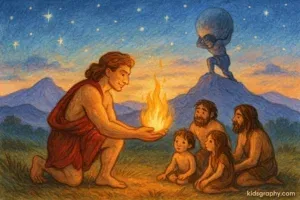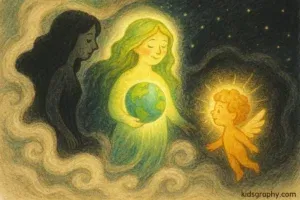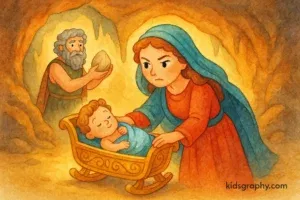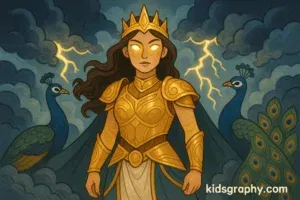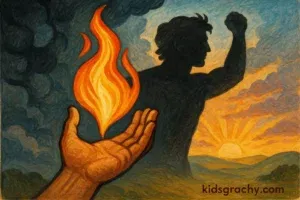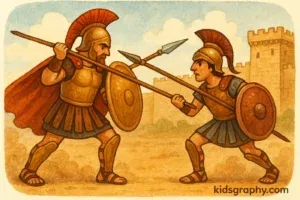Entering the World of Sacred Wildness
In the shadows of moonlit forests and the roar of crowded festivals, Dionysus dances with a crown of ivy and a goblet of wine. He is not a god of quiet temples or careful logic—he is the wild spirit of celebration, emotion, and transformation. With every sip of wine, every note of music, every moment of joyful madness, Dionysus breaks the chains of control and invites mortals to feel deeply, to lose themselves, and to find something sacred in surrender.
Dionysus is the god of wine, festivity, theatre, madness, and emotional ecstasy. His power lies not in force but in release—in the laughter that turns to tears, in the song that leads to catharsis. Where other gods demand obedience, Dionysus offers freedom, though never without cost. His realm is beautiful, dangerous, and alive.
Dionysus’ Divine Abilities
Dionysus is a god of many gifts, each connected to the human spirit. His most famous gift is wine—not just a drink, but a path to joy, release, and altered states of awareness. Through wine, Dionysus offers both comfort and confrontation. He allows people to escape, but also forces them to face what lies within.
His connection to theatre is just as powerful. The dramatic arts were born in his name. Ancient Greek tragedies and comedies were part of his festivals, with actors stepping into masks and becoming vessels for raw emotion. Dionysus turns art into experience. He makes performance a ritual, where truth emerges from illusion.
Another of his divine abilities is inducing divine madness. This is not simple chaos, but a holy frenzy—enthousiasmos—where people become filled with the god himself. In these moments, they scream, dance, weep, and discover parts of themselves long buried. It is overwhelming and beautiful.
He is also a god of transformation. Dionysus is a shapeshifter, appearing as a lion, bull, flame, or mist. He shifts forms as quickly as feelings change. This makes him unpredictable, but also deeply symbolic—he is the god who reflects the many sides of our nature.
Dionysus in Myth and Legend
The story of Dionysus begins with fire, death, and rebirth. His mother, Semele, was a mortal woman who bore Zeus’s child. When she asked to see Zeus in his full divine glory, she was burned to ashes. Zeus saved the unborn Dionysus by sewing him into his thigh. Months later, Dionysus was born again. This made him “twice-born”, a god who knew death and life.
As a young god, Dionysus traveled across the world, teaching people how to grow grapes and make wine. His journey was not peaceful—he was rejected, feared, and even attacked. But every time, Dionysus proved his divinity. He turned ships into vines, drove kings mad, and inspired worship through awe and ecstasy.
One famous tale is that of Pentheus, the king of Thebes. When Pentheus banned the worship of Dionysus, the god arrived in disguise. He lured the king into the forest to spy on the Maenads—women driven into holy madness. In their frenzy, they tore Pentheus to pieces, believing he was a wild animal. This myth warns against mocking what we do not understand. He demands respect not through force, but through the sheer power of emotional truth.
Symbolism
Dionysus is a god of duality. He represents joy and pain, order and chaos, life and death. His symbol is the grapevine—fragile, fruitful, and tangled. He embodies both creation and destruction. Through him, we see that deep emotion can heal or unravel, depending on how it’s faced.
He is also a symbol of personal freedom. In ancient Greece, his rites allowed people—especially women, slaves, and outsiders—to leave behind roles, names, and restrictions. In these moments, they became something more. Dionysus gave them not just joy, but identity beyond limits.
His madness is not meaningless. It reflects the hidden parts of the soul—the fears, desires, and griefs we push down. Through madness, Dionysus brings what is buried to the surface. He shows us that true clarity often begins in confusion.
Dionysus and the Sacred Stage
The theatre was Dionysus’s temple. In Athens, the City Dionysia was one of the largest festivals in his honor. Writers like Aeschylus, Sophocles, and Euripides presented plays exploring guilt, power, love, and fate. These were not just shows. They were spiritual events where the city gathered to cry, laugh, and reflect.
Through Dionysus, the stage became sacred. The mask became a path to truth. The play became a mirror for the audience to see themselves. Dionysus turned storytelling into transformation.
Modern Thought and Dionysus
Dionysus did not fade with ancient myth. Modern thinkers still study and revere him. Carl Jung saw Dionysus as the archetype of the repressed self—the wild, emotional shadow we must accept to be whole. Friedrich Nietzsche saw Dionysus as the soul of art, music, and creativity, balancing the cold order of Apollo with the fire of instinct and feeling.
In today’s world, Dionysus appears in music festivals, nightclubs, and creative spaces. Every moment where people let go and find beauty in chaos holds a spark of him. His presence is in the beat of a drum, the blur of tears during a song, the courage to feel deeply.
Lessons from Dionysus
Dionysus teaches us that joy is sacred, and so is pain. He reminds us to embrace what we feel. To dance when we grieve. To sing when we fear. And to allow ourselves to break open so that something new can grow.
He warns us not to fear emotion or try to control every moment. There is power in surrender. There is healing in madness. Dionysus walks with those who dare to feel it all.
To know Dionysus is to know freedom—not the freedom to escape life, but the freedom to live it fully.



